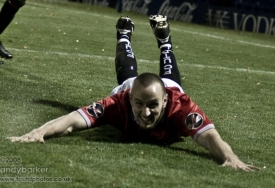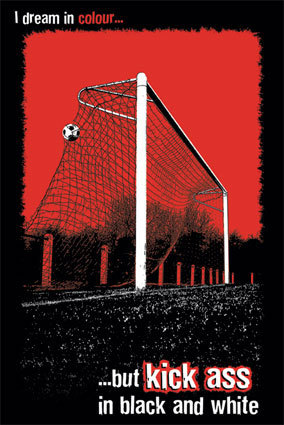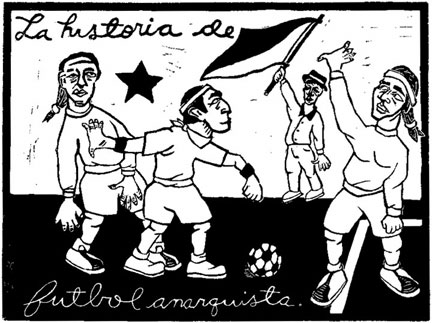SWAG has posted info from this excellent website before – http://anarchistsoccer.org/.
Here is more sports news from ORGANISE! for revolutionary anarchism – Magazine of the Anarchist Federation – Winter 2008 – Issue 71

FAN CONTROLLED FOOTBALL CLUBS
There has previously existed a tradition amongst some anarchists and Marxists to perceive sport as an ‘opium of the masses’; a distraction from the more pressing concerns of the working class—similar to religion. This argument could feasibly be extended to any pastime, from celebrity gossip, art and stamp collecting to poetry, theatre and cinema. The attitude of some anarchists towards sport (and usually any pastime that is not high-brow art, music or poetry) reflects that of the utilitarian philosopher John Stuart Mill, who, despite his belief that all pleasures are intrinsically good unless they result in harm, maintained that there exist ‘higher’ and ‘lower’ pleasures (On Liberty, 1859, London: Penguin Books). The opinion that sport, particularly football, is pointless and that enjoying it is a submission to the bourgeoisie smacks of elitism, and also raises the question as to whether sport would still be ‘permitted’ in a future anarchist society. Of course, the answer to this has to be ‘yes’, given our desire to live life for pleasure not profit, and requires us to discuss the issue of sport within an anarchist framework.
Sport provides people of all ages, races, cultures and genders with an opportunity to interact voluntarily with individuals outside of the workplace in a leisure environment. Like art and music, there are many different ways to take part in sport, either as spectator or player. Rather than look down upon sport, anarchists should view sport as an opportunity to meet other working-class people and to organise amongst ourselves for change. This article will thus document how working-class people have organised independent football clubs in place of corporate-dominated clubs in recent history.
In 1992 the clubs of the Football League First Division set up the FA Premier League to replace the former as the highest echelon of professional English football, bringing the 22 founder clubs (reduced to 20 for the 1995/96 season onwards) a huge influx of money due to an unprecedented television rights agreement with Rupert Murdoch’s ‘Sky Sports’ station. In the sixteen years since, both the commercial and popular appeal of football, particularly the Premier League, has skyrocketed. Top clubs such as Manchester United, Arsenal, Liverpool and more recently Chelsea can count their fans in the hundreds of millions, United alone boasting a third of a billion fans worldwide (‘Man Utd’s 333m fans’, Daily Mirror, 8 January 2008). The Premier League ‘brand’ is now touted as the best league in the world, the result being that each week’s round of games are seen as the next chapter in a soap opera, plugged relentlessly on satellite television. Matches are no longer a place to go and meet with friends, but a spectacle to be witnessed, either with potential corporate clients in a VIP suite, or in the safety of your own home on the television. Echoing the gentrification of many city centres, the traditional working-class base of the terraces have been replaced by members of the upper classes, with clubs only too happy to entertain them with luxury bars and expensive restaurants inside stadiums. For many working-class fans, the only option left for any sort of communal solidarity is to go to the pub and watch the game on a big screen TV.
The psychology of the game off the field has also changed drastically, with club executives and chairmen now more inclined to view fans as ‘customers’ of the club, rather than supporters with a right to a say in the club’s affairs. This attitude was most starkly demonstrated in the takeover of Manchester United by Malcolm Glazer, an American hedge-fund entrepreneur who left the club in $850m of debt after taking over as owner in spring 2005. In an effort to make back the money, Glazer has subjected season-ticket holders to a series of price increases, and led to a group of fans setting up a ‘rebel’ club, FC United of Manchester (FCUM), in protest at price hikes and the autocratic nature in which the club was being operated. The club’s founders drew up a manifesto outlining its opposition to the commercialisation of the Manchester United, the Premier League and the sport in general, and held a democratic vote to decide on the name of the club, with each of the potential names having varying degrees of relevance to the club they broke away from. FCUM’s policies of direct democracy and developing links with the local community, as well remaining a non-profit organisation and refusing to display a sponsor on club shirts will appeal to anarchists; “members have so far set season ticket prices, decided how much membership will cost, voted on how often the team’s playing strip will change and whether it will carry a sponsor or not” (Membership section of the FCUM website).
FCUM were also offered advice and support from AFC Wimbledon, another breakaway club who had formed after Wimbledon FC were taken over and relocated north to Milton Keynes. The plight of the Wimbledon fans was well-publicised, and to this day the fanzine ‘When Saturday Comes’ refuses to acknowledge the existence of the Milton Keynes Dons football club. The decision to move the club was unprecedented in League football (although non-league side Enfield were relocated to Borehamwood in 2001, spawning the formation of Enfield Town), and drew comparisons with the practice of ‘franchising’ that is evident in American sport, where a club can be moved to a new city if there is evidence for a more fertile market in this area. Thus, the NHL ice hockey club Québec Nordiques, sandwiched between two traditional hockey powerhouses, the Toronto Maple Leafs and the Canadiens du Montréal, was moved in the early 1990s to Denver, Colorado, where there was not another major hockey club for hundreds of miles in any direction.
The system of franchising has already extended to rugby league, where from next season clubs will have to meet strict criteria before entering the Super League, and the last decade has seen constant rumours of a breakaway continental Super League for European football based on a similar system. Only the richest and most profitable clubs would enter, severing their ties completely with the established domestic and European club competitions that are so popular with fans. Much of the protests against a Super League and franchising are characterised by a passion to retain what many fans love about the game. An entire culture or banter and rivalry has grown up around football, some unique to clubs, some widespread across the entire game. Outrage was rife when Manchester United chose not to defend the FA Cup in 2000, instead attending a World Club Challenge tournament in Brazil. The FA Cup retains a magic all of its own amongst English fans, and the club owners seemed oblivious to this, preferring to attend a tournament that, whilst sanctioned by FIFA, holds little value amongst fans. Similar protests were voiced against the Premier League’s proposed plan for a 39th round of games to take place in a number of locations worldwide. The plans were met with derision from across the British media, and many football federations voiced opposition to the arrogance of the Premier League. Fans have an acute sense of the money talking in football, and many are desperate to keep the traditions and culture of the game despite the ever-tightening grip that global capitalism holds on the game.
It is in this light that independent, fan-controlled clubs have sprung up. While the cases of AFC Wimbledon and FC United present anarchists with glamorous, anti-capitalist examples of fan-controlled clubs, other examples, notably AFC Liverpool and a raft of lower league teams such as Exeter City, Cambridge City, Notts County and Stockport County provide equally pragmatic examples. Despite season-long protests against the American owners at Liverpool football club, the formation of AFC Liverpool in spring 2008 was touted as an ‘affordable alternative’ rather than a new club, and sought to retain ties with Liverpool. Like FC United, AFC Liverpool operates according to a democratic vote from the membership and is not-for-profit, but has sought to distance itself from much of the anti-capitalist rhetoric of FC United and AFC Wimbledon. Nevertheless, the nature of the club represents an attempt by fans to organise alternatives to the ‘Big Football’ of the Premier League that is no longer affordable to the working classes. This strategy has indeed borne fruit; Exeter City was taken over by a fans’ trust following relegation to the Football Conference (the first tier of English football below the Football League), and was taken out of administration two years later, and promoted back to the Football League in May 2008. Even more remarkable is the rise of FC United, who started life in the second division of the North West Counties League—the tenth tier of English football—and will start the 2008/09 season in the seventh tier Northern Premier League, having being promoted every season since their inception.
However, it is not just on the field success that drives fan-controlled clubs. As stated above, FC United’s manifesto seeks to develop links with the local community and the youth of the area. Most notable was a ‘fan day’ held in 2008 as part of an anti-racist campaign where the club sold Fair Trade food, and the club emphasised that “…any activity such as ‘Kick Out Racism’ week has a strong element of being merely symbolic. However, we wish to stress our anti-racist and inclusive approach. We are a young club, and aim to ensure that our day will be the springboard to further activity.” (People United Day section of the FCUM website)
The club goes on to confirm its opposition to xenophobia and homophobia, as well as stating that “football is, today, central to many people’s ideas of community—and encouraging a sense of belonging is crucial if minorities are to feel included” (ibid). Clearly, the club wishes to actively involve itself in struggles that affect working class people, and the fact that a number of the club’s supporters are featured on the fascist Redwatch website is a testament to their efforts!
For football fans who despair at the influence of money on the game, the progress that fan-controlled clubs have made proves that the process of direct democracy and not-for-profit football is successful. The day has yet to come when a fan-controlled club reaches the Premier League, but perhaps Big Football and the money behind it will prove too strong for clubs such as Exeter City and Notts County who would not be able to compete financially for world-class players. Instead, the ambition for clubs such as AFC Liverpool, FC United and AFC Wimbledon is undoubtedly to reach at least the Football League, and many fans of the breakaway clubs would love to be drawn against the club that they broke away from in an FA Cup tie. The latter of these goals is merely the luck of the draw, but the former appears to be a not-too-distant prospect for AFC Wimbledon, who could be playing League football as early as 2011. For anarchists and fans alike, these clubs represent an aspect of everyday life that has been wrestled from capitalist hands and returned to the people, truly an example of creating a new ‘society’ inside the shell of the old. Apart from the largest Premier League clubs, the formation of a supporters’ trust that can gain control of a majority of club shares and turns the club into a not-for-profit organisation is not an unrealistic prospect; this has occurred at Cambridge City, Exeter City, Stockport County, Raith Rovers (albeit with the help of Gordon Brown!) and Notts County, and is perhaps a less extreme version of a traditional factory occupation! Making the connections between fan-control and anarchism and stressing the damage being done to football by capitalism to fans could result in an increase of anti-capitalist sentiment amongst working-class football fans. Football and other sports are a part of the community, and as a part of the community, anti-sport anarchists need to be engaging with fans, not looking down on them and trying to force them to ‘better’ themselves by rejecting sport. These alternative clubs are often defined by their solidarity with each other and their resistance to capitalism, something that anarchists should be congratulating and encouraging.

